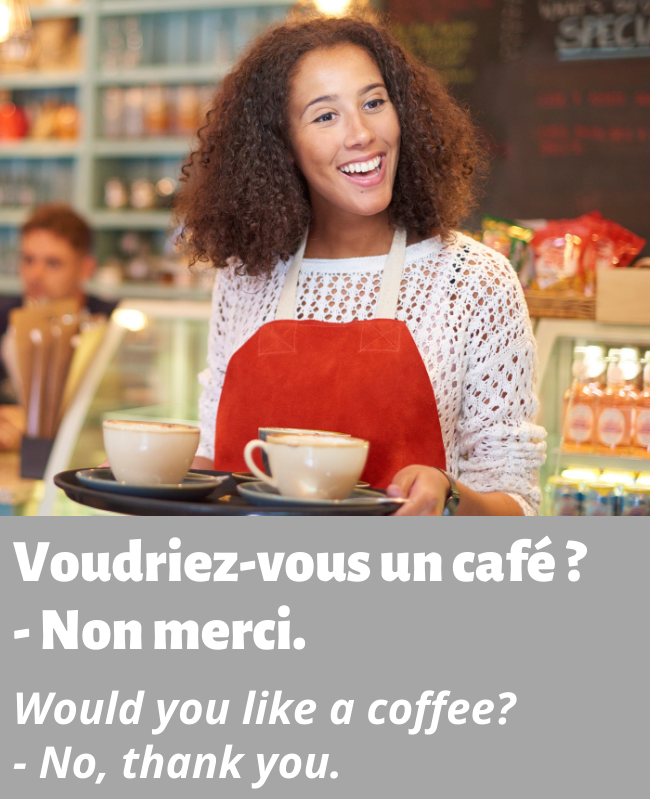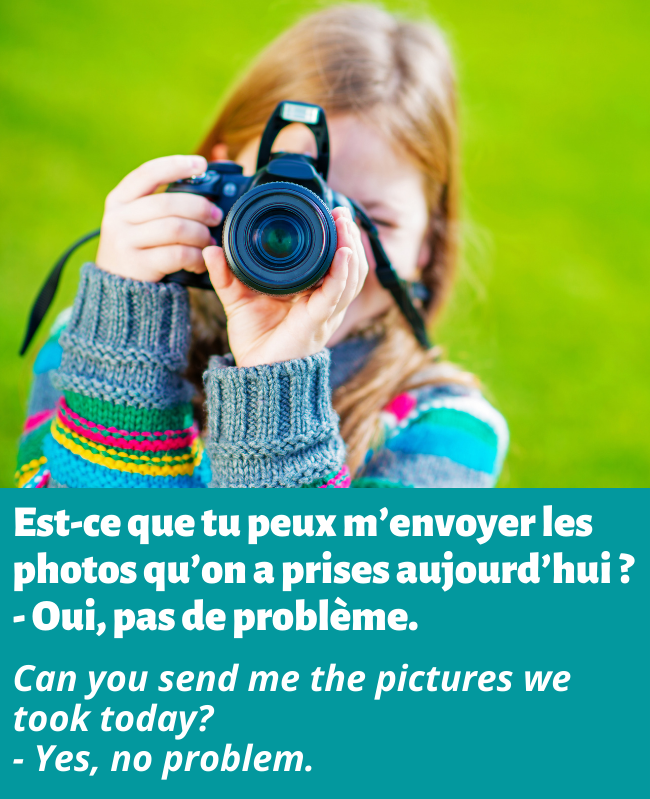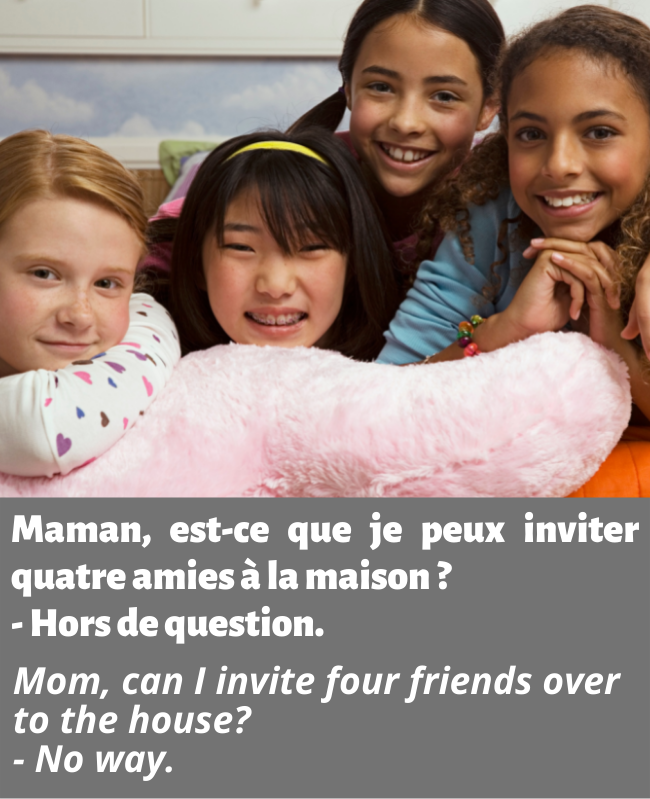
How to say “no” in French
“No” in French is non, a really useful word to know when speaking the language. Meaning simply no, non is one of the first French words English speakers learn.
But, there are actually a variety of ways to say no in French depending on the context. And whether you’re just starting to learn French or have been learning for years, it’s important to have different ways to express yourself in the negative.
Here you’ll learn some of the best ways to say no in French as well as some informal and formal versions of non.
After you’ve mastered this lesson you can learn the different ways to say yes in French.
Formal vs. Informal Ways to Say No In French
Like many words in the French language, there are both formal and informal ways to say no in French. An informal example is pas de souci, which means “no worries.” While a more formal example is il n’en est pas question, or “there is no question.”
But let’s dive into 17 ways to say no in French so you can see for yourself how to employ the negative in French—no matter what the setting.
Pas du tout
Pas du tout is a really common way to say no in French. It means “not at all,” but it is sometimes used a little differently than how it is used in English. In English we use “not all all” to emphasize the fact that our answer is no.
But it’s usually used in a more positive sense to reassure someone like this:
“Do you mind moving our coffee date from 2pm to 3pm?”
“No, not at all.”
You can use pas du tout in French in the same way as the example above, but you can also use it in a more negative sense.
For example, let’s say you’re looking for a place to eat lunch in Paris. Then, you walk into a restaurant that looks pretty full and you ask if they have a free table for two people.
The waitress could respond by saying, “Non, pas du tout,” or “No, not at all.” When I first heard this response in a similar situation, I almost felt like it was a little bit rude.
I felt like this because we don’t use “not at all” like this in English and it made me feel like it was almost silly that I asked the question in the first place. But pas du tout is actually a polite way to say no to somebody in French.
Pas encore
Pas encore means “not yet” in French. And you pretty much use it in the exact same way you use it in English.
Here’s an example:
Est-ce que tu as déjà mangé ? // Have you already eaten?
Pas encore. // Not yet.
Pas encore is also a form of French negation that means “not yet” or “still not.”
For example:
Je ne suis pas encore allé à Paris. // I still haven’t been to Paris.
Here pas encore changes the verb from “have been” to “still have not been.”
It’s interesting to note that the direct translation of encore is actually “again.” Its meaning is why people shout “encore” after the last song at a concert because you’re telling them to play again.
So, pas encore can also mean “not again.” In this sense, pas encore is usually used as an exclamation.
For example, let’s say your neighbors have been playing really loud music every night for a week. So you go over and tell them to please turn it down.
They turn down the music for a few days, but then they start playing the music really loudly again. Subsequently, you could shout out, “Pas encore !” or “Not again!” when you hear it.

Non merci
French people use non merci as a polite way to say “no” in French. It means “no thank you.” Non merci is a great phrase to have in formal situations as well as informal settings.
Voudriez-vous un café ? // Would you like a coffee?
Non merci. // No, thank you.
Another way to use non merci in French is in the phrase non merci, sans façons. But, this phrase is not as common as other ways to say no in French.
But, it’s still a great phrase to have in your French handbook.
Non merci, sans façons literally means “No thanks, without fuss.” Though, you use it to mean “No thanks, I’m fine” or “No, honestly, but thank you anyway.”
Absolument pas
Absolument pas means “absolutely not.” You use absolument pas as a strong way to emphasize a negative statement.
Here’s an example:
Est-ce que tu veux faire du camping ce week-end ? // Do you want to go camping this weekend?
Absolument pas. // Absolutely not. (This is the response you would use if you really dislike camping.)
Pas vraiment
Pas vraiment is a way to say no in French that is not very forceful or definite. It means “not really” and can be used in a variety of situations.
Here’s an example:
Est-ce que tu aimais le nouveau Batman ? // Did you like the new Batman?
Pas vraiment. // Not really.
Je crois que non
Je crois que non means “I don’t think so” or “I don’t believe so” in French. You’ll use this form of no in French when you’re not 100% sure of your response.
Let’s look at this example:
Est-ce qu’elle est végétarienne ? // Is she vegetarian?
Je crois que non. // I don’t think so.
Moi non
If you’re looking for how to say, “not me” in French, you can say, “moi non.” Moi non literally means “me no,” but you can use it to mean “not me.”
Here’s an example:
Est-ce que quelqu’un veut faire du shopping ? // Does anyone want to go shopping?
Moi non. // Not me.
Non jamais
In French, non jamais means “no, never.” Just like in English, you’ll use this phrase when talking about something you’ve done at no point in time.
Est-ce qu’il voyage beaucoup ? // Does he travel a lot ?
Non jamais. // No, never.

Pas de problème
Pas de problème means “no problem” and is used very often in French. But, it’s mostly used in informal settings.
Here’s an example:
Est-ce que tu peux m’envoyer les photos qu’on a prises aujourd’hui ? // Can you send me the pictures we took today?
Oui, pas de problème. // Yes, no problem.
Another phrase that often replaces pas de problème is pas de souci. Pas de souci means “no worries” and is mostly used by the younger generations.
You’ll often hear pas de problème and pas de souci among French friends.
Vous avez tort
Vous avez tort means “you are wrong.” It comes from the verb phrase “avoir tort,” which means “to be wrong.”
You can use vous avez tort like this:
L’Espagne est en Asie. // Spain is in Asia.
Non, vous avez tort. L’Espagne est en Europe. // No, you’re wrong. Spain is in Europe.
Ça ne marche pas
French speakers use ça ne marche pas to mean “that doesn’t work.” You can use it in formal contexts as well as informal ones.
Here’s how you might use it:
Est-qu’on peut aller au cinéma à 20h ? // Can we go to the movie theater at 8?
Non, ça ne marche pas pour moi. // No, that doesn’t work for me.

Hors de question
Hors de question is one of the different ways you can say no in French. It means “out of the question” or “no way” and is a strong way to say no.
You really only use this when you want to emphasize the fact that your answer is “no” and you won’t be changing your mind.
Take a look at this example:
Maman, est-ce que je peux inviter quatre amies à la maison ? // Mom, can I invite four friends over to the house?
Hors de question. // No way.
Malheureusement pas
Malheureusement pas is a common way to say no in French. It is the French equivalent of “unfortunately not” and is a good way to let someone down easy when saying no.
Here’s an example of how you can use it in a sentence:
Est-ce que tu vas dîner avec nous ce soir ? // Are you going to have dinner with us tonight?
Malheureusement pas. Je suis occupé. // Unfortunately not. I am busy.
Pas maintenant
Pas maintenant is a French phrase you can use in an informal or formal situation. It means “not now.”
You might hear a native speaker saying pas maintenant when telling someone that they do not want to talk to them or do something right now. This might be because they are busy or tired so it’ll likely be used between people who know each other rather than strangers.
Though, you could hear this from an overwhelmed/cranky waiter or in a tense work situation.
Here’s an example:
Papa, est-ce qu’on peut acheter de la glace ? Dad, can we buy ice cream?
Pas maintenant. Not now.

Bien sûr que non
There are a few different ways to say “of course not” in French, but bien sûr que non is one of the most common. This is a stronger way of saying no in French so when you hear this, you definitely know it’s a negative response.
“Of course not” can also be translated to jamais de la vie (in more informal situations) and sûrement pas (in more formal contexts).
Since bien sûr que non is a very definitive way to say no, in the French culture it is sometimes used in more serious situations.
For example:
Fils, est-ce que vous avez pris 20 euros de mon portefeuille ? // Son, did you take 20 euros from my wallet?
Bien sûr que non, Papa. // Of course not, Dad.
Ça va pas
In the French language, ça va pas can be used as an interjection in a similar way to “no way!”. This phrase actually comes from ça ne va pas, but is shortened in more informal contexts.
Ca va pas can also translate to “you must be joking” or “are you crazy?” It’s only used in contexts where you disagree with someone or a certain situation.
Here’s an example:
Quoi ? 5 euros ? Pour une baguette ? ça va pas ! // What? 5 euros? For a baguette? No way!
Il n’en est pas question
If you hear a French person say il n’en est pas question, it’s likely in a formal situation. Meaning, “there is no question” or “there is no way” and is a way to refuse something.
But, in more informal settings, you might hear French speakers say pas question, which is just a shortened version of the above phrase.
Here’s an example:
Quand je te dis non c’est non ! Tu n’as que 15 ans, il n’en est pas question que tu ailles en soirée jusqu’à 2h du matin ! // When I say no, it’s no. You are only 15 years old, there is no way you are going to a party until 2 in the morning.
